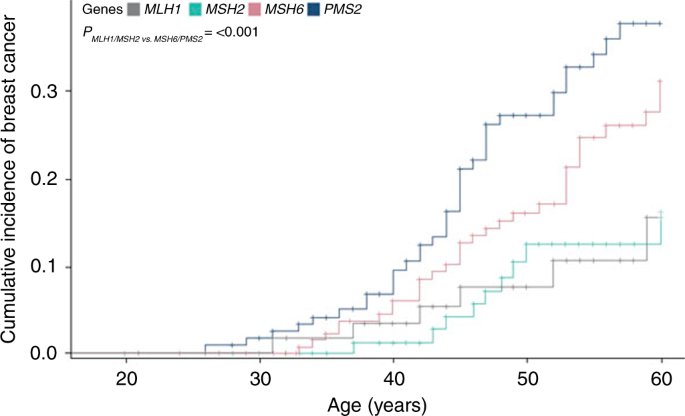Is breast cancer part of the Lynch syndrome spectrum?

The increased risk of colorectal cancer among people diagnosed with Lynch syndrome has been well studied, but the risk of developing certain other cancers is less settled. In this issue, a collaborative team from Columbia University and GeneDx, a genetic testing company, report an association between pathogenic variants in MSH6 and PMS2 and an increased risk of breast cancer. The two genes encode proteins involved in mismatch repair of single base pair mismatches during DNA replication. Pathogenic variants within four known genes associated with Lynch syndrome lead to an increased mutation load and attendant increased cancer risk. The researchers studied 423 women who had undergone multigene hereditary cancer panel testing completed at GeneDx between 2013 and 2016 and who tested positive for Lynch syndrome. They then calculated standardized incidence ratios for breast cancer for each of the four Lynch syndrome–associated genes as the number of observed cancers to the number of expected cancers based on comparators derived from the Surveillance, Epidemiology, and End Results (SEER) 18 database. They found a two- and threefold increased risk of breast cancer for the women with MSH6 and PMS2 pathogenic variants, respectively, but no breast cancer association for the other two genes, MLH1 and MSH2. The researchers suggest that women found to be carrying MSH6 or PMS2 pathogenic variants may benefit from increased breast cancer screening. However, most prior clinical studies have not found such an association, and further research will be necessary before the finding should be acted on clinically. —Karyn Hede, News Editor
Formalin-fixed tissue can yield actionable genomic data, but challenges remain
The ubiquity of formalin-fixed, paraffin-embedded (FFPE) tumor specimens makes them an attractive potential source of genomic information, but there has been doubt that the DNA in such samples would be intact enough to generate clinically useful information. A large investigative team from the 1000 Genomes Project reports that under some circumstances FFPE tissue returns data as good as those from fresh specimens. Robbe et al. evaluated 184 cases at Oxford University Hospitals Foundation Trust’s Genomics Medicine Centre. Nearly half (87) of the cases were excluded because fresh tissue samples were not available for the patient and 30 were excluded because the FFPE DNA was not of sufficient quality for analysis. Of the original 184 cases, only 52 were ultimately suitable for analysis. Of these, FFPE tissue was successful in identifying 98% of clinically actionable variants. It should be noted that the DNA quality from the FFPE samples used in this study was much higher than is typical, due to fast DNA processing. Taking into account all the genetic variants evaluated, 90% of cancer-associated genes were found more frequently mutated in the FFPE data set than in the fresh data set. The comparison between fresh and fixed samples also yielded interesting results from the perspective of understanding the genetic variation among cancer cells, even within the same tumor. The genetic analysis showed clear intratumor heterogeneity, with sequencing yielding different results from fresh versus fixed patient samples. Genetic variation due to differences in tissue preparation makes it unlikely that the use of FFPE-derived DNA will be routine in the near future. —Karyn Hede, News Editor

Rights and permissions
About this article
Cite this article
Hede, K. In this issue. Genet Med 20, 1103 (2018). https://doi.org/10.1038/s41436-018-0332-x
Published:
Issue Date:
DOI: https://doi.org/10.1038/s41436-018-0332-x
